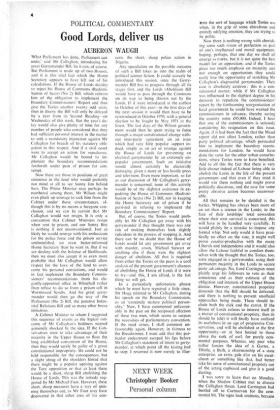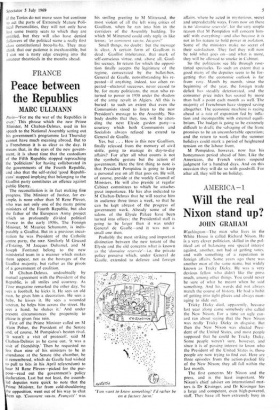POLITICAL COMMENTA RY
Good Lords, deliver us
AUBERON WAUGH
`What Parliament has done, Parliament can undo,' said Mr Callaghan, introducing his great Gerrymander Bill. So it can, of course. But Parliament is made up of two Houses, and it is this vital fact which the Home Secretary appears to have left out of his calculations. If the House of Lords decides to reject his House of Commons (Redistri- bution of Seats) (No 2) Bill, which relieves him of the obligation to implement the Boundary Commissioners' Report and thus give the Tories another twenty odd seats, then in theory the Bill will only be delayed by a year from its Second Reading—on Wednesday of this week. But the year's de- lay would also give plenty of time for any number of people who considered that they had suflicient personal interest in the matter to seek a mandatory injunction against Mr Callaghan for breach of his statutory obli- gation in this respect. And if a civil court were to accept an action for mandamus, Mr Callaghan would be bound to im- plement the boundary recommendations forthwith under pain of prison for con- tempt.
Now there are those in positions of great eminence in the land who would probably not mind at all to see Sunny Jim behind bars. The Prime Minister may perhaps be numbered among them. Mr Wilson might even pluck up courage to sack him from the Cabinet under those circumstances, al- though this is by no means a foregone con- clusion, and we can be certain that Mr Callaghan would not resign. It is only a convention that Cabinet Ministers resign when sent to prison, and our Sonny Boy is nothing if not unconventional. Just as likely he would emerge with his enthusiasm for the police force and the prison service undiminished, an even better-informed Home Secretary than he went in. But if we are dealing with the balance of likelihoods, then we must also accept it as even more probable that Mr Callaghan would allow respect for the laws of the land to over- come his personal convictions, and would in fact implement the Boundary Commis- sioners' recommendations from his ele- gantly-appointed office in Whitehall rather than refuse to do so from a prison cell in Wormwood Scrubs. And his great gerry- mander would then go the way of the Parliament (No 2) Bill, the putative Indus- trial Relations Bill and so many other brave initiatives.
A Cabinet Minister to whom I suggested this sequence of events as the logical out- come of Mr Callaghan's boldness seemed genuinely shocked by the idea. If the Con- servatives were to take advantage of their majority in the Upper House to flout the long established convention of the House, then they would surely be guilty of a grave constitutional impropriety. He could not be held responsible for the consequences, but a slight shrug of the shoulders hinted that there might be a popular uprising against the Tory opposition or that at least there would be a short, sharp Bill abolishing the House of Lords. This was the remedy sug- gested by Mr Michael Foot. However, these short, sharp measures have a way of spin- ning themselves out, as Mr Foot may have discovered in that other area of his con- cern, the short, sharp police action in Nigeria.
Any speculation on the possible outcome of such a Bill takes us into the realm of political science fiction. It could scarcely be introduced this session, since the Gerry- mander Bill has to progress through all its stages first, and the Lords (Abolition) Bill would have to pass through the Commons on its way to being thrown out by the Lords. If it were introduced at the earliest in October of this year—in the first days of the next session it would then have to be reintroduced in October 1970, with a general election to be fought by May 1971 at the latest. The last days of the Wilson govern- ment would then be spent trying to force through a major constitutional change with- out inter-party agreement, on an issue which had very little popular support in- deed, simply as an act of revenge against the House of Lords for preventing an electoral gerrymander by an extremely un- popular government. Such an initiative would almost certainly be electorally damaging. given a more or less hostile press and television. Even more important, so far as our discussion of Mr Callaghan's gerry- mander is concerned, none of this activity would be of the slightest assistance in ex- pediting the House of Commons (Redistri- bution of Seats) (No 2) Bill, nor in keeping the Home Secretary out of prison if he persisted in refusing to implement the Boundary Commissioners' Report.
But, of course, the Tories would prob- ably let Mr Callaghan get away with his gerrymander if they thought there was any risk of making themselves look slightly ridiculous in the process of stopping it. And there can be no doubt that the House of Lords would let any government get away with murder, arson, Michael Stewart or anything else if there were the slightest danger of abolition. All that is required from either the Tories or the peers is a cool analysis of the present government's chances of abolishing the House of Lords if it were to try—and this, I am afraid, is the last thing we will get.
In a particularly unfortunate phrase which he must have regretted a little since, Mr Hogg referred to Mr Callaghan, during his speech on the Boundary Commission, as an 'extremely mature political person- ality.' Now, I have commented unfavour- ably in the past on the reciprocal affection of these two men, which seems to surpass the necessities of parliamentary convention. If the need arises, I shall comment un- favourably again. However, in fairness to the Breadwinner, I must add that this par- ticular endearment escaped his lips before Mr Callaghan's statement of intent to gerry- mander, at which point all the kissing had to stop. I resurrect it now merely to illus- trate the sort of language which Tories use when, in the grip of some chivalrous and entirely edifying emotion, they are trying to be polite.
Now there is nothing wrong with cherish- ing some such vision of perfection as part of one's intellectual and moral equipment. hoping, perhaps, that one day we shall all emerge as EMPPS, but it is not quite the best model for an opposition; and if the Tories place too much emphasis on maturity and not enough on opportunism they could easily lose the opportunity of scotching Mr Callaghan's disgraceful gerrymander. Their case is absolutely castiron: this is a con- stitutional matter; while if Mr Callaghan was influenced to the slightest degree in his decision to repudiate the commissioners' report by the forthcoming reorganisation of local government he could have warned the commissioners in advance, thereby saving the country some £95,000. Indeed, I hear that one of the commissioners is seriously considering his resignation on this issue. Again, if it had been the fact that the Maud report did not affect London, rather than party political advantage, which persuaded him to implement the boundary recom- mendations for London, he would have done the same for the other urban conurba- tions, where Tories were to have benefited. Add to all this the fact that there is very little chance indeed of Labour being able to abolish the Lords in the life of the present government and that even if they tried it would win them nothing and might prove politically disastrous, and the case for some pretty abrasive action becomes unanswer- able.
All that remains to be decided is the tactics. Whipping has always been more of an art than a science in the Lords; in the face of their lordships' total cowardice where their own survival is concerned, this will have to be handled very carefully. It would plainly be a mistake to impose any formal whip. Not only would it have prac- tically no effect on the vote, it might well prove counter-productive with the many Liberals and independents and it would also allow the Labour faithful to comfort them- selves with the thought that the Tories, too, were engaged in a gerrymander, using their permanent majority in the Lords to secure party advantage. No, Lord Carrington must plainly urge his followers to vote as their conscience and as their estimate of the obligation and interests of the Upper House dictate. However, constitutional propriety demands that the Bill should be defeated, and there is nothing to prevent unofficial approaches being made. These should in- clude both the stick and the carrot. If the House of Lords refuses to interest itself in a matter of constitutional propriety, then (it should be told) it will finally have outlived its usefulness in an age of progressive Con- servatism, and will be abolished at the first opportunity—or at best limited to those above the rank of earl, for purely cere- monial purposes. Whereas, any peer who rather fancies the idea of a Garter, a Thistle, a Bath, a chairmanship of a state enterprise, an extra gule d'or on his escut- cheon or something like that, had better take his sense of constitutional propriety out of the acting cupboard and give it a good dusting.
I was sorry to learn that on Monday, when the Shadow Cabinet met to discuss the Callaghan threat, Lord Carrington had beetled off to Caernarvon for the cere- monial bit. The signs look ominous, because if the Tories do not move soon but continue to act the parts of Extremely Mature Poli- tical Personalities, they will not only have lost some twenty seats to which they are entitled, but they will also have denied followers of the political scene a really first class constitutional brou-ha-ha. They may think that our patience is inexhaustible, but I can see a nasty edge creeping into the amateur theatricals in the months ahead.



































 Previous page
Previous page